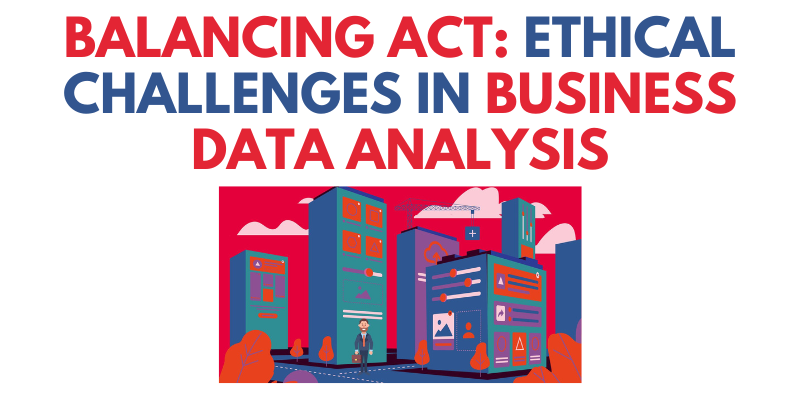In the age of big data, business specialists are critical in assisting organisations in making data-driven choices. However, this power comes with great responsibility. Ethical considerations in data analysis have become increasingly important. In this blog article, we will look at the ethical issues that business analysts frequently face when dealing with data and offer advice on how to use data responsibly.
Ethical Challenges in Data Analysis for Business Analysts
Data Privacy and Consent
One of the foremost ethical challenges business analysts face is ensuring data privacy and obtaining informed consent. Organizations often collect vast amounts of personal information from customers and employees. It’s crucial to handle this data carefully, obtain consent when necessary, and protect sensitive information from breaches or misuse.Ethical data handling is a fundamental aspect of responsible business analysis, especially in the context of a career at educational institutions like MBA Colleges in Chennai.
Transparency in Data Collection
Transparency is essential in data collection. Business analysts should be upfront about what data they are collecting and why. This transparency fosters confidence among parties while also ensuring that individuals understand how their data will be utilised.
Bias in Data Analysis
Bias in data analysis can lead to unfair outcomes. Business analysts must be aware of potential biases in data sources or algorithms and work to mitigate them. This may involve adjusting data sets, selecting unbiased algorithms, or conducting fairness audits.
Data Security and Protection
Ensuring data security is paramount. Business analysts must protect data from cyber threats and unauthorized access. This includes using encryption, access controls, and regularly updating security protocols.
Guidance on Responsible Data Usage
Data Governance Policies
Develop and implement clear data governance policies within your organization. These policies should outline data collection, storage, usage procedures, and ethical guidelines.
Data Anonymization and Aggregation
Anonymize and aggregate data whenever possible to protect individual privacy. Avoid handling sensitive information in its raw form unless necessary for the analysis. Ethical data handling practices are essential in the field of data analytics, especially for individuals pursuing an MBA In Data Analytics, as they ensure that data is leveraged responsibly and without compromising individuals’ privacy and confidentiality.
Continuous Learning and Training
Keep up to date on the most recent ethical issues and best practises in data analysis. Encourage continuous learning and training for yourself and your team. Understanding the evolving landscape of data ethics is essential.
Collaboration with Ethical Experts
Collaborate with experts in ethics, legal compliance, and data privacy. Seek their guidance when dealing with complex ethical dilemmas. Their input can help navigate tricky situations and ensure responsible data usage.
Conclusion
Business analysts, including those pursuing careers in MBA Business Analytics In Chennai, are at the forefront of the data-driven revolution in organizations. However, with great power comes great responsibility. However, with great power comes great responsibility. Ethical considerations in data analysis should be considered. Upholding data privacy, ensuring transparency, addressing bias, and safeguarding data security are essential ethical responsibilities for business analysts. By following responsible data usage guidelines and staying informed about ethical best practices, business analysts can navigate data analysis challenges while maintaining trust and integrity in their organizations. Ethical data analysis is not just a choice; it’s necessary in today’s data-driven world.


*
*